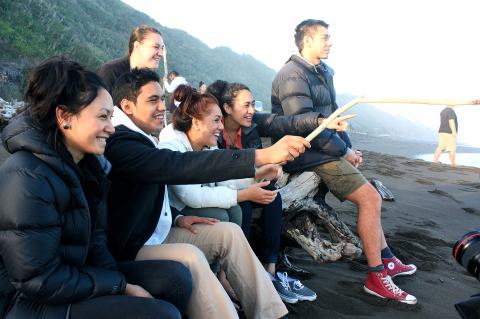In Maori mythology, their ancestors lived in a land called Hawaiki before migrating across the Pacific Ocean and settling in Aotearoa, the Maori word for New Zealand.
Hawaiki’s location — and even its existence — is the subject of debate, but some scholars speculate that “Hawaiki” may actually refer to Taiwan. Now a new film, currently in pre-production and seeking fundraising, will explore what this academic theory means for young Maori and Taiwanese Aboriginal people in search of their roots.
Developed by the ATAYAL Organization, a non-profit, the film will follow a group of Maori students as they meet people of indigenous descent in Taiwan. Scheduled to be completed next January, Beyond Hawaiki still needs to raise 75 percent of its NT$13,886,700 budget.

Photo courtesy of Tony Coolidge and Tobie Openshaw
“What I would like to do is allow these students to interact with indigenous students, share their language and culture and look for similarities,” says ATAYAL Organization founder Tony Coolidge (陳華友).
Coolidge also hopes the film will increase exposure for the ATAYAL Organization’s Tap Root Cultural Exchange Program, which will bring together people from indigenous communities throughout the Austronesian region.
Raised in the US, Coolidge did not learn about his Atayal roots until his Taiwanese mother died in 1994. Coolidge’s quest to reconnect with his maternal family’s Aboriginal heritage — and find out why it had been hidden from him — was the subject of the 2010 documentary Voices in the Clouds (眾族同聲).

Photo courtesy of Tony Coolidge and Tobie Openshaw
While learning about his background, Coolidge also became fascinated with Maori culture and began to brainstorm ways to facilitate connections between Austronesian tribal groups.
“Learning about Austronesian theory made [that goal] even more concrete and gave it an academic foundation,” says Coolidge. “It’s more than just bringing tribes around the world together. It’s also an opportunity to create a family reunion.”
Coolidge and filmmaker Tobie Openshaw met with Maori students and potential “Beyond Hawaiki” subjects from the Auckland University of Technology when they traveled to New Zealand in July to attend the Wairoa Maori Film Festival.
During their trip, Openshaw filmed interviews with several young Maoris.
“I asked them what does being Maori actually mean to you personally? How do you straddle traditional culture with having to make your way in the world of today?” Openshaw says.
Openshaw plans to incorporate footage shot by the students, who have learned how to combine Maori storytelling traditions with digital filmmaking techniques, into “Beyond Hawaiki.” Some of the young people he interviewed said they became closer to their families while reconnecting with their heritage, but others were met with opposition when they decided to study Maori culture.
“There is this one guy who looks white. His father is white and his mother is Maori, and he had to overcome a whole bunch of things,” says Openshaw. “He said his father asked him ‘Why do you want to go do that nigger stuff for?’ His family grew up white and it was at a great personal sacrifice that he decided to go on a four-year Maori course.”
Beyond Hawaiki’s NT$13,886,700 fundraising goal will cover travel, production, marketing and legal expenses. A complete breakdown of the project’s budget is available at www.atayal.org/beyond-hawaiki.php. There will also be volunteer opportunities for people who want to participate in the making and distribution of the documentary.
Coolidge hopes Beyond Hawaiki will help the Tap Root Cultural Exchange Program expand.
“We’ll start with the Maori coming to Taiwan and bringing Taiwanese to New Zealand, and we will expand to new countries every year,” he says. “If all goes well, we’ll have a movie with each country added.”
Coolidge adds: “So many people in Taiwan have an Austronesian background and they don’t know it. I’m hoping that by creating an exchange between people, kids can see more opportunities for the future.”
■ For more information about Beyond Hawaiki and the Tap Root Cultural Exchange Program, visit www.atayal.org

Taiwan has next to no political engagement in Myanmar, either with the ruling military junta nor the dozens of armed groups who’ve in the last five years taken over around two-thirds of the nation’s territory in a sprawling, patchwork civil war. But early last month, the leader of one relatively minor Burmese revolutionary faction, General Nerdah Bomya, who is also an alleged war criminal, made a low key visit to Taipei, where he met with a member of President William Lai’s (賴清德) staff, a retired Taiwanese military official and several academics. “I feel like Taiwan is a good example of

March 2 to March 8 Gunfire rang out along the shore of the frontline island of Lieyu (烈嶼) on a foggy afternoon on March 7, 1987. By the time it was over, about 20 unarmed Vietnamese refugees — men, women, elderly and children — were dead. They were hastily buried, followed by decades of silence. Months later, opposition politicians and journalists tried to uncover what had happened, but conflicting accounts only deepened the confusion. One version suggested that government troops had mistakenly killed their own operatives attempting to return home from Vietnam. The military maintained that the

Before the last section of the round-the-island railway was electrified, one old blue train still chugged back and forth between Pingtung County’s Fangliao (枋寮) and Taitung (台東) stations once a day. It was so slow, was so hot (it had no air conditioning) and covered such a short distance, that the low fare still failed to attract many riders. This relic of the past was finally retired when the South Link Line was fully electrified on Dec. 23, 2020. A wave of nostalgia surrounded the termination of the Ordinary Train service, as these train carriages had been in use for decades

Lori Sepich smoked for years and sometimes skipped taking her blood pressure medicine. But she never thought she’d have a heart attack. The possibility “just wasn’t registering with me,” said the 64-year-old from Memphis, Tennessee, who suffered two of them 13 years apart. She’s far from alone. More than 60 million women in the US live with cardiovascular disease, which includes heart disease as well as stroke, heart failure and atrial fibrillation. And despite the myth that heart attacks mostly strike men, women are vulnerable too. Overall in the US, 1 in 5 women dies of cardiovascular disease each year, 37,000 of them